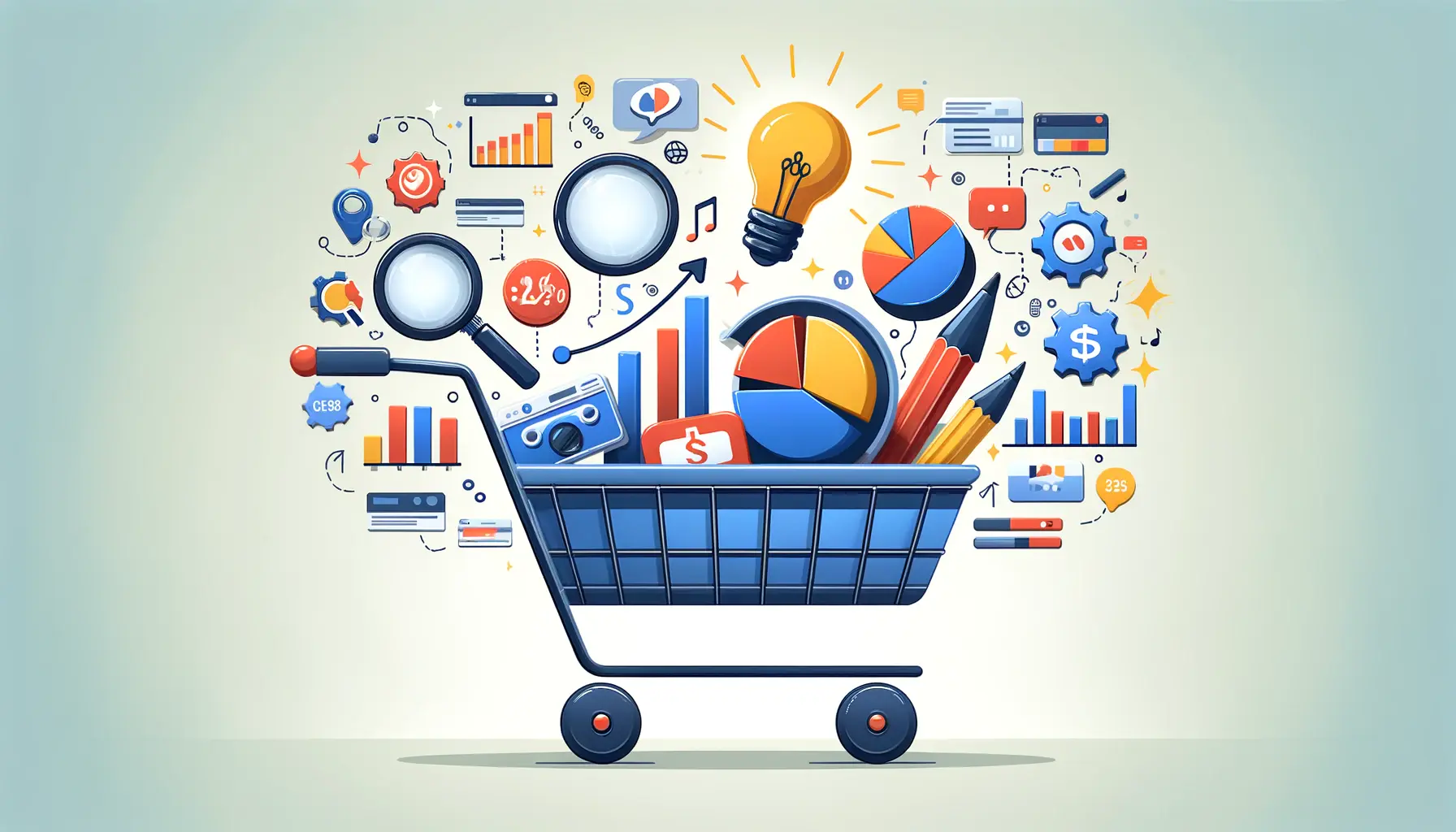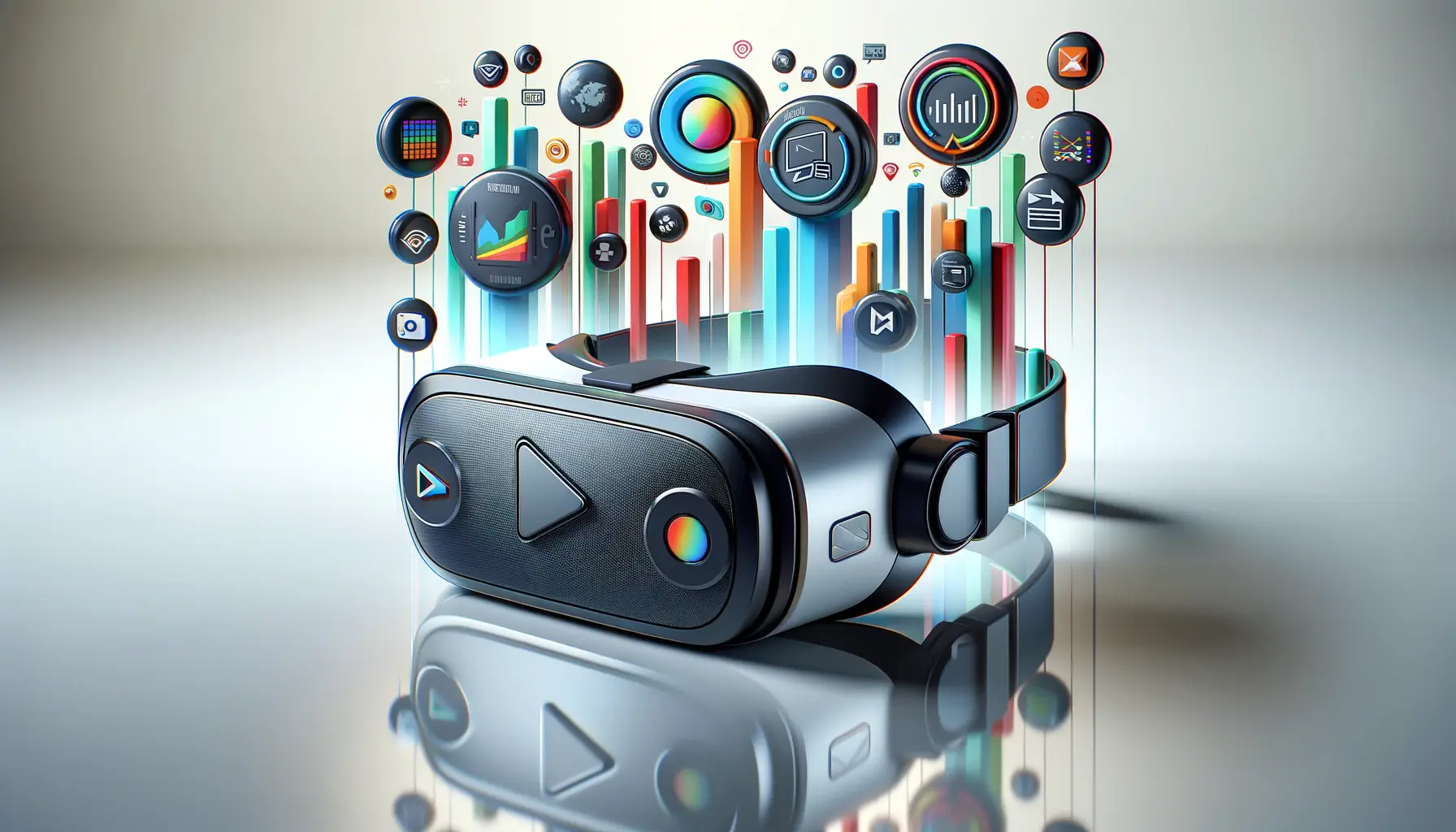The digital marketing landscape is continually evolving, with Pay-Per-Click (PPC) advertising standing at the forefront of this change, especially in the realm of content marketing.
As businesses strive to navigate the complexities of online visibility and audience engagement, PPC emerges as a pivotal strategy, not just for immediate traffic gains but as a significant influencer of content marketing strategies.
This synergy between PPC and content marketing is reshaping how marketers approach their online campaigns, blending the instantaneity of PPC with the depth and engagement offered by content marketing.
In this detailed exploration, we delve into the latest PPC trends that are shaping the content marketing sphere.
These trends highlight the innovative ways marketers can leverage PPC to enhance their content’s reach, engagement, and overall impact.
By understanding these trends, businesses can unlock new opportunities, drive more targeted traffic, and achieve a better return on investment (ROI) from their digital marketing efforts.
- Integration of PPC with Content Marketing Strategies
- Emerging Technologies in PPC
- Optimizing PPC Campaigns for Mobile Users
- Enhancing PPC with Audience Segmentation and Personalization
- Maximizing ROI with Smart Bidding and Automation
- Adapting to the Evolving PPC Landscape
- Future-Proofing PPC Campaigns with Advanced Analytics
- Conclusion: Navigating the Future of PPC in Content Marketing
- PPC Trends Affecting Content Marketing FAQs
Integration of PPC with Content Marketing Strategies
The Convergence of Paid and Organic Reach
The digital marketing world is witnessing a significant shift towards the integration of PPC campaigns with content marketing strategies.
This trend is driven by the need to amplify content reach and engagement in an increasingly competitive online space.
By strategically placing PPC ads that lead to high-quality content, marketers can not only boost their visibility but also enhance user engagement with their brand.
This approach ensures that the content reaches a broader yet targeted audience, maximizing the potential for lead generation and conversion.
Moreover, this integration facilitates a more cohesive user journey from ad click to content interaction.
It ensures that the content served aligns with the user’s search intent, thereby improving the overall user experience and supporting the path to conversion.
Marketers are now focusing on creating ads that seamlessly blend with their content strategy, using PPC to drive traffic to articles, blogs, and videos that resonate with their target audience’s interests and needs.
Personalization and Targeting Precision
Another key trend is the enhanced personalization and targeting capabilities within PPC campaigns, thanks to advancements in AI and machine learning.
Marketers can now deliver highly personalized ad experiences that match the user’s specific interests, search history, and behavior.
This level of personalization ensures that the PPC ads promoting content are relevant and appealing to each individual, increasing the likelihood of engagement and conversion.
Targeting precision has also seen significant improvements, with PPC platforms offering more granular targeting options.
Marketers can target their ads based on demographics, interests, behaviors, and even specific keywords related to their content.
This allows for a more focused approach to content promotion, ensuring that the ads reach individuals most likely to find the content valuable and engaging.
Leveraging PPC for content marketing not only enhances visibility but also ensures that your content reaches the most relevant audience, driving both engagement and conversions.
Emerging Technologies in PPC
The realm of PPC is rapidly evolving, influenced by emerging technologies that offer new opportunities for content marketers to captivate their audience.
These technologies not only enhance the efficiency of PPC campaigns but also provide innovative ways to present content to the target audience.
Understanding and adopting these technologies can significantly impact the effectiveness of a content marketing strategy, making it crucial for marketers to stay ahead of the curve.
One of the most notable advancements is the rise of voice search optimization.
With the increasing use of digital assistants like Siri, Alexa, and Google Assistant, voice search has become an essential consideration for PPC campaigns.
Marketers are now optimizing their ads for voice search queries, which tend to be longer and more conversational than text-based searches.
This involves incorporating natural language and question-based phrases into ad copy and content, ensuring visibility in voice search results.
Artificial Intelligence and Machine Learning
- Automated Bidding Strategies: AI and machine learning algorithms can analyze vast amounts of data to optimize bidding strategies in real-time, ensuring that marketers get the best possible ROI on their ad spend.
- Ad Personalization: These technologies enable the creation of highly personalized ads based on user behavior, search history, and preferences, leading to increased engagement and conversion rates.
- Content Optimization: AI tools can suggest content topics and formats that are likely to perform well, based on analysis of existing content and audience engagement patterns.
Visual and Video Ads
The shift towards visual and video content in PPC campaigns is another trend driven by consumer preference for engaging and easily digestible content.
Video ads, in particular, have shown to significantly increase user engagement and conversion rates.
Marketers are leveraging platforms like YouTube and Instagram to run video PPC campaigns that direct viewers to comprehensive articles, infographics, and other forms of content.
This strategy not only enhances the visibility of the content but also provides a richer, more engaging user experience.
Furthermore, the use of augmented reality (AR) and virtual reality (VR) in PPC campaigns is beginning to take shape.
These technologies offer immersive experiences that can effectively capture the audience’s attention and provide interactive ways to engage with content.
Although still in the early stages, AR and VR ads represent a frontier for content marketing, offering unique opportunities to create memorable and impactful ad experiences.
Incorporating emerging technologies into your PPC campaigns can significantly enhance the reach and engagement of your content marketing efforts, offering a competitive edge in the digital landscape.
Optimizing PPC Campaigns for Mobile Users
The surge in mobile device usage has transformed how marketers approach PPC campaigns, making mobile optimization a critical factor for success.
With the majority of internet users accessing the web via smartphones and tablets, PPC campaigns must be tailored to meet the unique demands and behaviors of mobile users.
This shift towards mobile necessitates a reevaluation of ad formats, content presentation, and user interaction to ensure optimal performance on smaller screens.
Mobile optimization involves more than just making ads visible on mobile devices; it requires a strategic approach to design, content, and user experience.
For instance, ad copy must be concise yet compelling, as mobile users typically have shorter attention spans.
Additionally, call-to-action (CTA) buttons need to be prominently displayed and easy to tap, considering the limited screen real estate and the touch-based interaction of mobile devices.
Responsive Ad Design
- Ensuring ads automatically adjust to fit the screen size and orientation of the user’s device, providing a seamless viewing experience.
- Utilizing mobile-friendly ad formats, such as vertical video ads, which are more engaging for users who hold their devices in portrait mode.
Location-Based Targeting
- Leveraging GPS data to deliver ads to users based on their geographic location, enabling highly targeted marketing efforts that cater to local preferences and behaviors.
- Implementing location-specific ad copy and offers to increase relevance and appeal to users within a particular area or region.
Speed and Performance Optimization
- Minimizing load times for landing pages linked from PPC ads, as mobile users are less tolerant of delays and more likely to abandon slow-loading sites.
- Employing accelerated mobile pages (AMP) and other technologies to enhance page speed and improve the overall user experience on mobile devices.
Mobile optimization is not just a trend; it’s a necessity. By focusing on responsive design, location-based targeting, and speed optimization, marketers can significantly improve the effectiveness of their PPC campaigns in reaching and engaging mobile users.
Enhancing PPC with Audience Segmentation and Personalization
In today’s digital marketing landscape, the one-size-fits-all approach to PPC campaigns is no longer effective.
Audience segmentation and personalization have emerged as key strategies to enhance the relevance and impact of PPC ads.
By dividing the broader audience into smaller, more specific groups based on shared characteristics or behaviors, marketers can tailor their messaging and offers to better meet the needs and interests of each segment.
Personalization takes audience segmentation a step further by customizing the ad experience for individual users.
This approach leverages data such as browsing history, past purchases, and demographic information to create highly targeted ads that resonate on a personal level.
The result is a more engaging and compelling ad experience that significantly increases the likelihood of conversion.
Utilizing Data for Segmentation
- Demographic data (age, gender, location) to tailor ads to specific population segments.
- Behavioral data (purchase history, website interactions) to target users based on their past actions and preferences.
- Psychographic data (interests, values) to connect with users on a deeper, more emotional level.
Implementing Personalization Tactics
- Dynamic ad content that changes based on the user’s interaction with your website or app.
- Customized landing pages that reflect the specific interests or needs of the user, based on the ad they clicked.
- Retargeting campaigns that remind users of products or services they viewed but did not purchase, encouraging them to complete the transaction.
Effective audience segmentation and personalization require a deep understanding of your audience and access to detailed data.
However, the effort pays off in the form of higher engagement rates, increased conversion rates, and a better overall ROI for your PPC campaigns.
By delivering the right message to the right person at the right time, marketers can create more meaningful connections and drive significant business results.
True success in PPC now hinges on the ability to segment your audience and personalize the ad experience. This targeted approach not only enhances user engagement but also drives conversions by delivering ads that are highly relevant to each user’s needs and preferences.
Maximizing ROI with Smart Bidding and Automation
The advent of smart bidding and automation in PPC campaigns represents a paradigm shift in how marketers optimize their ad spend for maximum ROI.
Smart bidding, a subset of automated bid strategies powered by machine learning, allows advertisers to delegate complex bid optimization processes to algorithms.
These algorithms analyze vast amounts of data in real-time, adjusting bids to achieve the most favorable outcomes based on the advertisers’ specified goals.
Automation extends beyond bidding to encompass various aspects of PPC campaign management, including ad placements, targeting adjustments, and even creative optimizations.
This not only streamlines the campaign management process but also enhances performance by leveraging data-driven insights that would be impossible to process manually at scale.
Benefits of Smart Bidding Strategies
- Enhanced efficiency by automating bid adjustments, freeing up marketers to focus on strategic and creative aspects of their campaigns.
- Improved performance through the use of machine learning algorithms that predict the best bid amounts for each auction, maximizing the chances of achieving campaign goals.
- Greater control over campaign outcomes by setting specific objectives for smart bidding algorithms to target, such as maximizing conversions or achieving a target return on ad spend (ROAS).
Leveraging Automation for Campaign Optimization
- Automated rules that trigger specific actions based on predefined criteria, such as pausing underperforming ads or increasing bids for high-performing keywords.
- Machine learning-powered recommendations that identify opportunities for campaign improvements, from keyword expansions to ad copy optimizations.
- Integration with analytics platforms to automatically adjust campaigns based on deeper insights into user behavior and conversion paths.
While smart bidding and automation offer significant advantages, it’s crucial for marketers to maintain oversight and apply human judgment to ensure that automated decisions align with overall business goals and market dynamics.
The most successful PPC campaigns combine the efficiency and scalability of automation with the nuanced understanding and strategic oversight that only humans can provide.
Embracing smart bidding and automation in PPC campaigns can dramatically enhance campaign performance and ROI. By leveraging these advanced technologies, marketers can optimize their ad spend more effectively, achieving better results with less manual effort.
Adapting to the Evolving PPC Landscape
The PPC landscape is in a constant state of flux, with new trends, technologies, and consumer behaviors emerging regularly.
For marketers, staying ahead of these changes is crucial to maintaining competitive advantage and ensuring the continued effectiveness of their PPC campaigns.
Adapting to the evolving landscape requires not only vigilance but also a willingness to experiment with new approaches and technologies.
One of the key areas of change is the increasing importance of privacy and data protection.
With regulations like GDPR and CCPA shaping online advertising practices, marketers must find ways to deliver personalized and targeted ads without infringing on user privacy.
This has led to the adoption of privacy-first advertising strategies and the exploration of new targeting techniques that do not rely on personal data.
Exploring New Platforms and Formats
- Expanding beyond traditional platforms like Google and Facebook to newer or niche platforms where competition may be lower and engagement higher.
- Experimenting with emerging ad formats, such as interactive ads or shoppable posts, to capture user interest in innovative ways.
Emphasizing Quality and Relevance
- Focusing on creating high-quality, relevant ad content that provides value to the user, thereby improving ad performance and user experience.
- Utilizing advanced targeting and segmentation to ensure ads are shown to users most likely to be interested in the offer, enhancing both efficiency and effectiveness.
Integrating PPC with Other Marketing Channels
- Adopting a holistic approach to digital marketing by integrating PPC with SEO, social media, email marketing, and other channels to create a cohesive user journey.
- Leveraging data and insights from PPC campaigns to inform strategies in other channels, and vice versa, to maximize overall marketing ROI.
As the PPC landscape continues to evolve, marketers must remain agile, continuously learning and adapting their strategies to align with the latest trends and technologies.
By staying informed and open to experimentation, marketers can navigate the changes in the PPC landscape effectively, ensuring their campaigns remain impactful and deliver optimal results.
The key to success in the ever-changing PPC landscape is adaptability. Marketers who are willing to explore new platforms, experiment with emerging ad formats, and integrate PPC with other marketing channels will be best positioned to thrive in this dynamic environment.
Future-Proofing PPC Campaigns with Advanced Analytics
The future of PPC is not just about embracing new technologies or adapting to market changes; it’s also about harnessing the power of advanced analytics to drive smarter, more informed decision-making.
As the digital landscape becomes increasingly data-driven, the ability to analyze and interpret complex datasets has become crucial for optimizing PPC campaigns and ensuring long-term success.
Advanced analytics tools offer deep insights into campaign performance, user behavior, and conversion dynamics.
These tools enable marketers to go beyond surface-level metrics, uncovering the underlying factors that drive success or identify areas for improvement.
By leveraging these insights, marketers can refine their PPC strategies, targeting efforts, and content alignment to better meet the needs of their audience and achieve their business objectives.
Utilizing Predictive Analytics for Strategic Planning
- Employing predictive analytics to forecast future trends, user behaviors, and campaign outcomes, allowing marketers to proactively adjust their strategies for optimal performance.
- Identifying potential market opportunities or challenges ahead of time, enabling businesses to position their PPC campaigns for maximum impact.
Enhancing Personalization with Data Insights
- Using advanced segmentation and data analysis to create highly personalized ad experiences that resonate with individual users, increasing engagement and conversion rates.
- Integrating data from multiple sources to build a comprehensive view of the customer journey, facilitating more targeted and effective PPC campaigns.
Optimizing Budget Allocation with ROI Analysis
- Leveraging analytics to assess the ROI of different PPC campaigns and channels, ensuring marketing budgets are allocated to the most effective strategies.
- Continuously monitoring and adjusting budget distribution based on real-time performance data to maximize campaign efficiency and ROI.
Advanced analytics represent a powerful tool in the PPC marketer’s arsenal, offering the insights needed to navigate the complexities of the digital advertising landscape.
By embracing analytics-driven strategies, marketers can future-proof their PPC campaigns, ensuring they remain competitive and continue to deliver strong results in an ever-evolving market.
The integration of advanced analytics into PPC campaign management is essential for future-proofing your digital marketing efforts. By leveraging deep data insights for strategic planning, personalization, and budget optimization, marketers can enhance campaign performance and secure a competitive edge in the digital marketplace.
Conclusion: Navigating the Future of PPC in Content Marketing
The dynamic interplay between PPC and content marketing is reshaping the digital advertising landscape, offering marketers unprecedented opportunities to enhance their online visibility and engage with their target audience more effectively.
As we’ve explored, the integration of PPC with content marketing strategies, the adoption of emerging technologies, and the optimization of campaigns for mobile users are just a few of the trends setting the stage for a new era of digital marketing.
Moreover, the emphasis on audience segmentation and personalization, coupled with the strategic use of smart bidding and automation, underscores the importance of leveraging data-driven insights to refine PPC campaigns.
As the digital environment continues to evolve, staying ahead of these trends will be crucial for marketers aiming to maximize their ROI and achieve sustainable success.
Key Takeaways for Future-Proofing Your PPC Campaigns
- Embrace the convergence of PPC and content marketing to amplify reach and engagement.
- Leverage emerging technologies like AI, voice search optimization, and video ads to stay ahead of the curve.
- Optimize PPC campaigns for the mobile-first world, ensuring seamless user experiences across devices.
- Implement advanced audience segmentation and personalization techniques to enhance ad relevance and impact.
- Utilize smart bidding and automation to improve efficiency and campaign performance.
- Adapt to the evolving PPC landscape by exploring new platforms, formats, and integrating PPC with other marketing channels.
- Harness the power of advanced analytics for strategic planning, personalization, and budget optimization.
In conclusion, the future of PPC in content marketing is bright, filled with opportunities for innovation and growth.
By staying informed about the latest trends, experimenting with new strategies, and leveraging data to inform decisions, marketers can navigate the complexities of the digital world with confidence.
The key to success lies in the ability to adapt, innovate, and continually refine your approach to PPC, ensuring that your content marketing efforts resonate with your audience and drive meaningful results.
Want your website to top Google search rankings? Leave the SEO to our professional agency!
PPC Trends Affecting Content Marketing FAQs
Explore the most common inquiries surrounding the dynamic relationship between PPC and content marketing.
PPC, or Pay-Per-Click, is an advertising model where marketers pay a fee each time their ad is clicked, aiming to drive traffic to their website.
PPC can amplify content reach, drive targeted traffic to high-quality content, and enhance engagement, complementing organic content marketing efforts.
While PPC ads don’t directly affect SEO rankings, the increased traffic and user engagement can indirectly benefit the overall SEO performance.
Emerging PPC trends include the integration of AI and machine learning, voice search optimization, and a focus on mobile-first advertising strategies.
With the majority of users accessing content via mobile devices, mobile optimization is crucial for the success of PPC campaigns.
Audience segmentation allows for more targeted and personalized PPC campaigns, improving ad relevance and effectiveness.
Smart bidding uses machine learning to optimize bids for each ad auction, aiming to maximize conversions and ROI.
Content marketers should watch for trends like increased data privacy measures, the rise of video and interactive ads, and the continued importance of analytics.













